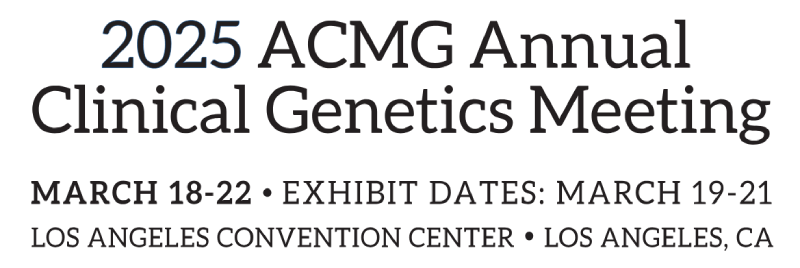R. Rodney Howell Symposium: Using DNA as a Population Health Screen: ACMG's Efforts to Define a Primary Findings (PF) List for Health Screening
22 Mar 2025
Venue:
Los Angeles Convention Centre
Meeting Room:
West Exhibit Hall B
Health Services and Implementation
-
Accredited:
- Accredited
-
Primary Categories:
- Population Genetics
-
Secondary Categories:
- Population Genetics
In 2013 the ACMG addressed a key question facing those who were creating whole genome and whole exome datasets for individuals as part of clinical diagnostic testing. The question was what findings should the data be screened for that were not part of the primary diagnostic intent in creating the dataset i.e. secondary findings beyond with the diagnostic result. These efforts have led to an ongoing series of policy and position statements known collectively as the "ACMG Secondary Findings (SF) List" (now in version 3.2).
In 2023 the ACMG Board of Directors commissioned a Population Screening Workgroup to address a distinct question, that is: if genomic datasets are being created for the purpose of population health screening, then what are the screening findings, i.e. "Primary Findings" (PF) that should be offered back to individuals who participate. This session will feature talks from members of the ACMG Population Screening Workgroup on the efforts behind the creation of the "ACMG Primary Findings (PF) Version 1.0 List". It is anticipated that the release of the ACMG PF Version 1.0 list for population screening will be the initiation of an ongoing and iterative process, that will be informed by evolving evidence and will seek to provide guidance for those around the world who are embarking on the important work of contributing to healthier individuals and healthier populations through DNA-based health screening. The speakers will address: the distinction between primary and secondary findings, how newborn screening selection of conditions can inform the PF process, the history and future of using DNA as a tool for population health screening, the implications of the choice of the molecular technologies employed on the programmatic output of a population screening program, and the importance of aiming to deliver benefits to all members of a population through attention to diversity, equity, and inclusion within screening programs. Examples of gene-condition pairs to be included on the ACMG PF v1.0 List for population screening will be discussed.
In 2023 the ACMG Board of Directors commissioned a Population Screening Workgroup to address a distinct question, that is: if genomic datasets are being created for the purpose of population health screening, then what are the screening findings, i.e. "Primary Findings" (PF) that should be offered back to individuals who participate. This session will feature talks from members of the ACMG Population Screening Workgroup on the efforts behind the creation of the "ACMG Primary Findings (PF) Version 1.0 List". It is anticipated that the release of the ACMG PF Version 1.0 list for population screening will be the initiation of an ongoing and iterative process, that will be informed by evolving evidence and will seek to provide guidance for those around the world who are embarking on the important work of contributing to healthier individuals and healthier populations through DNA-based health screening. The speakers will address: the distinction between primary and secondary findings, how newborn screening selection of conditions can inform the PF process, the history and future of using DNA as a tool for population health screening, the implications of the choice of the molecular technologies employed on the programmatic output of a population screening program, and the importance of aiming to deliver benefits to all members of a population through attention to diversity, equity, and inclusion within screening programs. Examples of gene-condition pairs to be included on the ACMG PF v1.0 List for population screening will be discussed.
Learning Objectives
- Define the concept of "primary findings"in genomic screening and support its application
- Examine the current and expanding role of genomic screening in public health
- Contrast the effect of the molecular technique (e.g. SNP array v. exome) on the potential programmatic screening output
- Identify approaches for improved inclusivity when delivering screening results to a population
- Assess the value of applying the approaches used in selecting conditions for newborn screening to DNA-based population screening
Agenda
-
 Distinguishing the Strategies Underlying Primary and Secondary Findings Identification and Followup Care10:15 AM – 10:35 AM
Distinguishing the Strategies Underlying Primary and Secondary Findings Identification and Followup Care10:15 AM – 10:35 AM -
 How the Newborn Screening (NBS) Approach to the Selection of Conditions Can Potentially Inform DNA-based Population Screening10:35 AM – 10:55 AM
How the Newborn Screening (NBS) Approach to the Selection of Conditions Can Potentially Inform DNA-based Population Screening10:35 AM – 10:55 AM -
 DNA Screening in the Context of Public Health10:55 AM – 11:15 AM
DNA Screening in the Context of Public Health10:55 AM – 11:15 AM -
 Impact of Technology Choices on Programmatic Output from Genomic Screening Programs11:15 AM – 11:35 AM
Impact of Technology Choices on Programmatic Output from Genomic Screening Programs11:15 AM – 11:35 AM -
 DNA Population Screening and Inclusivity11:35 AM – 11:55 AM
DNA Population Screening and Inclusivity11:35 AM – 11:55 AM -
Panel DiscussionPanel Discussion and Q&A11:55 AM – 12:15 PM
-




)
)
)
)
)
)
)
)
)
)
)
)
)
)
)
)
)
)
)
)